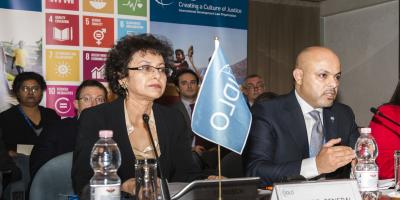
Opening IDLO’s Partnership Forum in December, President of IDLO’s Assembly of Parties, Nawaf Al-Mahamel, acknowledged that the event came at an important time for the organization with the Assembly of Parties having just approved its Strategic Plan for the next four years.
The plan, he said, had emerged against the backdrop of a ‘challenging external environment, but was inspired by the vision of the UN’s 2030 Development Agenda’; the forum, he added, was an opportunity to explore access to justice as a driver of sustainable development and contributor to building peaceful and just societies, as embodied in Goal 16 of the new Sustainable Development Goals (SDGs).
As one of the chief negotiators of the SDGs, special guest Brazilian ambassador to the United Nations, Antonio de Aguiar Patriota, initiated discussions on the contentious origins of Goal 16. He admitted that perhaps the biggest challenge remaining was now its implementation.
For her part, IDLO’s Director-General, Irene Khan, elaborated on two crucial aspects of IDLO’s new Strategic Plan – emerging from analysis of external trends and from the SDGs – access to justice, and equality and inclusion. Ms. Khan said the organization’s focus would center around empowering people to understand and claim their rights and ensuring institutions work effectively.
She called for the active participation of those present, whose contributions and practical experiences would help IDLO further develop and shape this plan. Concluding the opening session, she posed a series of key questions to shape the Forum’s discussions on how institutions can be supported and how they can gain public trust, how people can be empowered, and how to deliver results.
In the first panel discussion of the afternoon on fair laws and effective institutions, participants considered the practicalities of creating a culture of justice.
Describing the challenges at a national level, the Attorney-General of Afghanistan, H.E. Mohammad Farid Hamidi, began by introducing the context in his country when he took office several months earlier, one of the most pressing being tackling ‘a culture of using the judiciary as a political tool’. The other main issue, he added, was lack of capacity. Even ten months ago, he said, justice sector actors did not have legal training. He went on to discuss the efforts of his office to develop human capacity, to change recruitment policies and remove prosecutors with no legal background; in eight months, they had recruited more than 400 new, trained prosecutors, and increased the ratio of women from 3% to over 50% during this period. ‘We need the capacity of capable lawyers and judges,’ he concluded, ‘this is how we bring the rule of law to Afghanistan.’
The Ukrainian ambassador to Rome, Yevhen Perelygin, praised the growing reach and activities of IDLO and, in particular, the organization’s work in Ukraine, which he described as responding to local, emerging demand, where corruption was a top priority.
Jelena Madir, Chief Counsel for the Financial Law Unit of the European Bank for Reconstruction and Development, also acknowledged the work they conduct in partnership with IDLO training judges and legal professionals. She said often, from their experience, new laws were on the books but not enforced, probably because judges do not feel equipped. EBRD partnered with organizations like IDLO to host training, but, she added, this is of limited value if the international experts then just leave. She highlighted the need for the training of trainers – a focus of much of IDLO’s work - if momentum is to be maintained.
While discussions so far had been dominated by developing countries’ experiences, in contrast and reflecting the universally applicable nature of the new SDGs, Italian Minister Alfredo Durante Mangoni focussed on his nation’s fight against corruption – which will be a major priority under Italy’s G7 presidency. Referencing the role of the rule of law in also supporting economic development as well as justice, Minister Mangoni acknowledged the perception of corruption associated with Italy was a potential obstacle to attracting foreign investment.
Participants also heard from IDLO’s Country Director in Somalia, and the representatives of Senegal, Kuwait, Libya and Montenegro.
Opening the second panel discussion of the afternoon on the theme of access to justice, especially for marginalised and vulnerable groups, SUNY Professor Makau Mutua began by flagging the common misconstruction of rule of law and access to justice as an end, rather than a means to an end. He urged participants to consider how those on the margins could be brought into the center, the role of civil society, and recognition of informal systems.
The Attorney-General of Myanmar, H.E. U Tun Tun Oo, spoke of justice sector reform aimed at strengthening the rule of law in his country, the five-year strategic plan of his office, and how IDLO was working to support this crucial work in an historic period of transition for Myanmar.
Meanwhile, Dr. Alicia Beatriz Pucheta de Correa, President of the Supreme Court of Justice of Paraguay, spoke of the need for inclusion in the justice system, illustrating some of the many services introduced in her country to improve access to justice. She described measures that ensure judges give priority to vulnerable groups, innovative solutions to inform people of their rights and services from apps to phone lines and text message services. As a country with a high indigenous population, Dr. Correa also elaborated on the efforts made to make the formal system accessible to this group.
Poor people are no less human but are less able to access justice,’ Dunstan Mlambo, Judge President of the High Court of South Africa, claimed. But they face inherent biases against them in legal systems, he added, giving examples from access to legal aid to ratios of rich to poor executed.
He concluded the final session confirming that he had witnessed many times ‘the difference legal aid makes to lives’.
Representatives of the Netherlands and IDLO staff from Honduras and Liberia also contributed to this session’s discussion.

